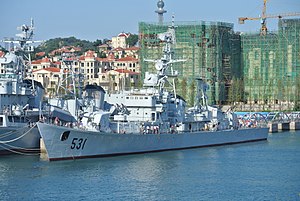Chinese frigate Yingtan (531)
Appearance
 Yingtan as a museum ship in Qingdao.
| |
| History | |
|---|---|
| Name |
|
| Namesake | Yingtan |
| Builder | Hudong Shipyard, Shanghai[1] |
| Laid down | 1970[1] |
| Launched | 1971[2] |
| Commissioned | December 1974[2] |
| Decommissioned | 1994[2] |
| Identification | Pennant number: 531 |
| Status | Museum ship at the Chinese Navy Museum, Qingdao |
| General characteristics | |
| Class and type | Type 053K frigate |
| Displacement | |
| Length | 103.2 m (339 ft)[1] |
| Beam | 10.2 m (33 ft)[1] |
| Draft | 3.1 m (10 ft)[1] |
| Propulsion |
|
| Speed | 26 knots[1] |
| Range | 4,000 nmi (7,400 km; 4,600 mi) at 15 knots (28 km/h; 17 mph)[1] |
| Complement | 185[1] |
| Sensors and processing systems | |
| Electronic warfare & decoys | 2 x Jug Pair ESM[1] |
| Armament | |
Yingtan (531) was the sole Type 053K (NATO reporting name: Jiangdong) frigate constructed by the People's Republic of China for the People's Liberation Army Navy (PLAN).[2] She was equipped with HQ-61 surface-to-air missiles (SAM) and the Type 381 radar, making her the first PLAN ship equipped with either surface-to-air missiles or modern air search radar.[1]
Yingtan formally entered service in 1974, but was only named on 1 August 1986. She participated in the Johnson South Reef Skirmish in 1988. The frigate retired in 1994 and became a museum ship at the Chinese Navy Museum in Qingdao.[2]
A sister ship was being constructed at the Qiuxin Shipyard by 1979[1] but was not completed.
Gallery
[edit]-
The forward HQ-61 SAM launcher.
-
The rear HQ-61 SAM launcher.
-
The forward superstructure with the Sun Visor 8 fire control radar atop the bridge.



